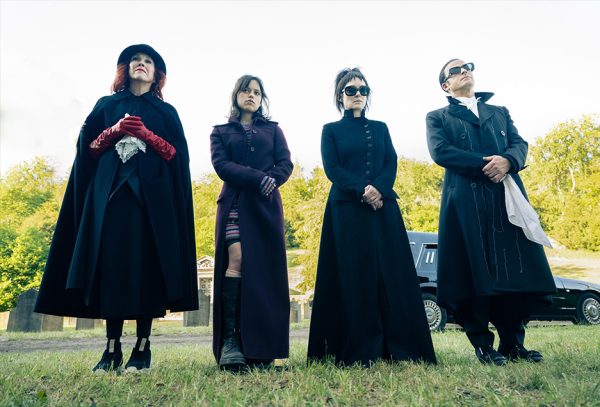Fincher’s triumphant return to filmmaking
A Review of “Mank”
Before turning on “Mank”, several thoughts flew through my head: This is David Fincher’s first movie in six years. It has Gary Oldman. It’s black-and-white. This has to be good. Right?
“Mank” is directed by David Fincher and stars Gary Oldman as Herman Mankiewicz, the man who wrote the script for “Citizen Kane”, commonly regarded as one of the greatest movies ever made, if not the greatest. The film follows his process of writing it while struggling with alcohol addiction and his fight for receiving credit from the obsessive director Orson Welles, played by Tom Burke, and how he found his inspiration for writing it six years earlier, while in a feud with newspaper magnate William Randolph Hearst, played by Charles Dance, who might have been the inspiration for “Kane’s” main character. Along the way, the film attempts to have commentary on the state of Old Hollywood, socialism and backhanded politics, amongst a bevy of other things.
Before 2020 happened and ruined nearly everything, “Mank” was one of my most anticipated movies of the year. David Fincher is one of my favorite directors, having made superb dramas like “The Social Network” and “Gone Girl”, while also making violent classics like “Seven” and “Fight Club”. His meticulous style of directing and framing shots is something I’ve always admired, but with “Mank” he takes a back seat to the excellent screenplay written by his late father, Jack. This is definitely a writer’s movie, which makes sense, given the job of the main character. The script is oddly reminiscent of Aaron Sorkin’s work in “The Social Network”, as both contain the witty, rapid-fire dialogue that made Sorkin a hot commodity in Hollywood. To make a long story short, this isn’t Fincher’s best movie. In fact, it’s nowhere close. However, this is another great entry in a career that hasn’t produced a bad, even lackluster, film.
One of the many wonderful things about “Mank” is how it looks and sounds. Aside from the well-known actors and Fincher’s brilliant direction, the film looks and sounds like a movie that one would’ve watched in the 1930s or 40s. Erik Messerschmidt’s gorgeous cinematography still manages to be just as eye-popping as any other film, despite the black-and-white aesthetic. Composers Trent Reznor and Atticus Ross have traded their trademark creeping electronic work for period-accurate strings and brass, and the result is some of their best work yet: work that will most likely give them an Oscar each come awards season. Even the sound mixing is perfect, sounding just as fuzzy as the films from the days of Old Hollywood. The film will even occasionally show cigarette burns in the top right corner of the screen, as if telling the nonexistent projectionist when to switch reels. As a self-described film maniac, I couldn’t get enough of it. However, this is one of the film’s few flaws. It’s hard to see casual moviegoers liking “Mank” anywhere near as much as I or other film aficionados will. It’s definitely Fincher’s least accessible film. Another problem is the editing. Kirk Baxter is a phenomenal editor, the winner of two Oscars for “The Social Network” and “The Girl With the Dragon Tattoo”. Both of these films, the latter being two-and-a-half hours long, flew by at lightspeed thanks to Baxter’s immaculate editing. However, with “Mank”, the film drags quite a lot in the first and third acts, and I’m not quite sure if it was a conscious choice by Fincher to have a slow-burn feel, or if it’s a legitimate flaw.
However, what kept the film interesting at all times was the impeccable acting. If Oldman hadn’t just won his first Oscar for portraying Winston Churchill in “Darkest Hour”, he would be the unanimous choice for Best Actor. He completely disappears behind Mankiewicz, praise that is only reserved for the best performers working today. However, Amanda Seyfried steals every scene she’s in as Marion Davies, an actress who might have been the inspiration for one of the characters in “Citizen Kane”. It’s a caliber of performance that I would never have expected from her, and it will most likely lead to an Oscar of her own. Aside from one notable exception, the rest of the acting is first-rate, especially from Dance, whose scenes with Oldman seem to boil with tension. However, that one exception is Burke, who sticks out like a sore thumb. His performance is just fine. Solid, at best. With a cast this amazing, an actor can’t afford to be just fine. It doesn’t help that he’s saddled with the regular generic dialogue for a generic villain.
Aside from the slow pace and Burke’s performance, I found “Mank” to be a very good film, benefitting from great direction, amazing performances and some truly phenomenal writing. Don’t be surprised if the film’s name is called several times on Hollywood’s biggest night, because I won’t be.
Rating: A-
Your donation will support the student journalists of Cypress Woods High School. Your contribution will allow us to purchase equipment and cover our annual website hosting costs.






